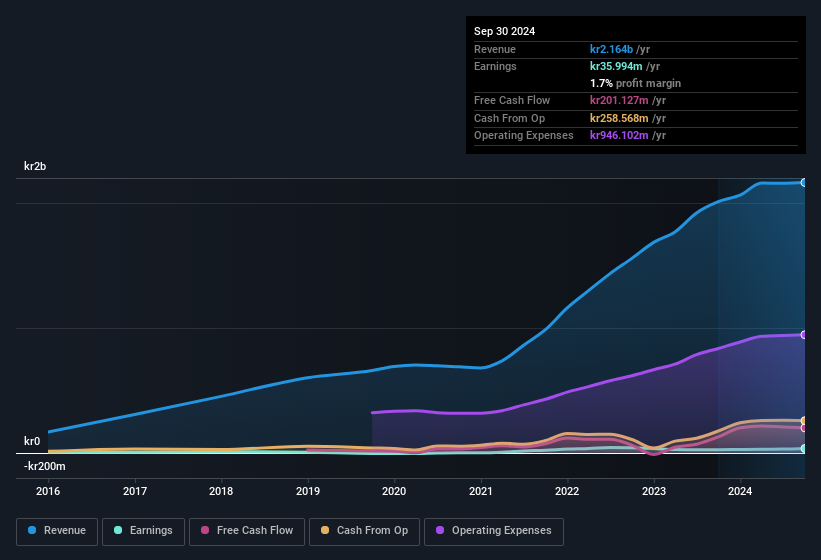- Sweden
- /
- Industrials
- /
- OM:IDUN B
We Think Idun Industrier's (STO:IDUN B) Robust Earnings Are Conservative

Idun Industrier AB (publ)'s (STO:IDUN B) strong earnings report was rewarded with a positive stock price move. We have done some analysis, and we found several positive factors beyond the profit numbers.
Check out our latest analysis for Idun Industrier

Examining Cashflow Against Idun Industrier's Earnings
Many investors haven't heard of the accrual ratio from cashflow, but it is actually a useful measure of how well a company's profit is backed up by free cash flow (FCF) during a given period. In plain english, this ratio subtracts FCF from net profit, and divides that number by the company's average operating assets over that period. This ratio tells us how much of a company's profit is not backed by free cashflow.
As a result, a negative accrual ratio is a positive for the company, and a positive accrual ratio is a negative. While having an accrual ratio above zero is of little concern, we do think it's worth noting when a company has a relatively high accrual ratio. That's because some academic studies have suggested that high accruals ratios tend to lead to lower profit or less profit growth.
Over the twelve months to September 2024, Idun Industrier recorded an accrual ratio of -0.11. Therefore, its statutory earnings were quite a lot less than its free cashflow. In fact, it had free cash flow of kr201m in the last year, which was a lot more than its statutory profit of kr36.0m. Idun Industrier's free cash flow improved over the last year, which is generally good to see. Notably, the company has issued new shares, thus diluting existing shareholders and reducing their share of future earnings.
That might leave you wondering what analysts are forecasting in terms of future profitability. Luckily, you can click here to see an interactive graph depicting future profitability, based on their estimates.
One essential aspect of assessing earnings quality is to look at how much a company is diluting shareholders. Idun Industrier expanded the number of shares on issue by 8.2% over the last year. Therefore, each share now receives a smaller portion of profit. Per share metrics like EPS help us understand how much actual shareholders are benefitting from the company's profits, while the net income level gives us a better view of the company's absolute size. Check out Idun Industrier's historical EPS growth by clicking on this link.
How Is Dilution Impacting Idun Industrier's Earnings Per Share (EPS)?
As you can see above, Idun Industrier has been growing its net income over the last few years, with an annualized gain of 61% over three years. And at a glance the 37% gain in profit over the last year impresses. On the other hand, earnings per share are only up 20% in that time. And so, you can see quite clearly that dilution is influencing shareholder earnings.
Changes in the share price do tend to reflect changes in earnings per share, in the long run. So it will certainly be a positive for shareholders if Idun Industrier can grow EPS persistently. But on the other hand, we'd be far less excited to learn profit (but not EPS) was improving. For the ordinary retail shareholder, EPS is a great measure to check your hypothetical "share" of the company's profit.
Our Take On Idun Industrier's Profit Performance
In conclusion, Idun Industrier has strong cashflow relative to earnings, which indicates good quality earnings, but the dilution means its earnings per share growth is weaker than its profit growth. Given the contrasting considerations, we don't have a strong view as to whether Idun Industrier's profits are an apt reflection of its underlying potential for profit. So if you'd like to dive deeper into this stock, it's crucial to consider any risks it's facing. Our analysis shows 2 warning signs for Idun Industrier (1 is potentially serious!) and we strongly recommend you look at these bad boys before investing.
In this article we've looked at a number of factors that can impair the utility of profit numbers, as a guide to a business. But there are plenty of other ways to inform your opinion of a company. For example, many people consider a high return on equity as an indication of favorable business economics, while others like to 'follow the money' and search out stocks that insiders are buying. So you may wish to see this free collection of companies boasting high return on equity, or this list of stocks with high insider ownership.
New: AI Stock Screener & Alerts
Our new AI Stock Screener scans the market every day to uncover opportunities.
• Dividend Powerhouses (3%+ Yield)
• Undervalued Small Caps with Insider Buying
• High growth Tech and AI Companies
Or build your own from over 50 metrics.
Have feedback on this article? Concerned about the content? Get in touch with us directly. Alternatively, email editorial-team (at) simplywallst.com.
This article by Simply Wall St is general in nature. We provide commentary based on historical data and analyst forecasts only using an unbiased methodology and our articles are not intended to be financial advice. It does not constitute a recommendation to buy or sell any stock, and does not take account of your objectives, or your financial situation. We aim to bring you long-term focused analysis driven by fundamental data. Note that our analysis may not factor in the latest price-sensitive company announcements or qualitative material. Simply Wall St has no position in any stocks mentioned.
About OM:IDUN B
Idun Industrier
An investment holding company, engages in the manufacture and sale of glass fiber reinforced fat- and oil separators in Sweden.
Reasonable growth potential with proven track record.
Market Insights
Community Narratives



